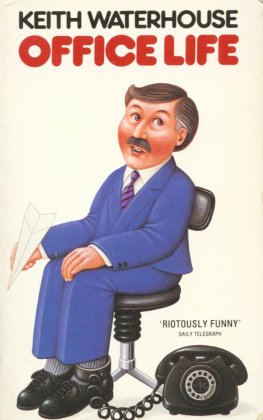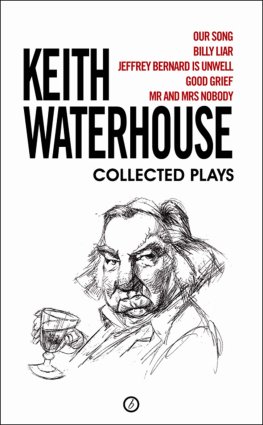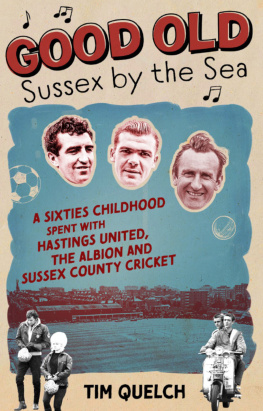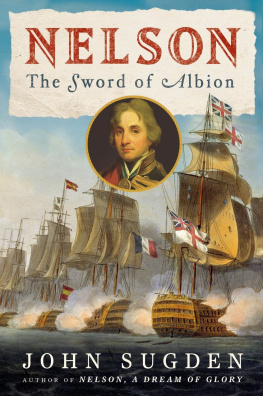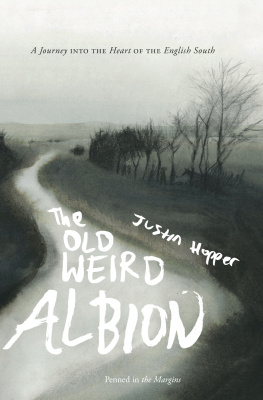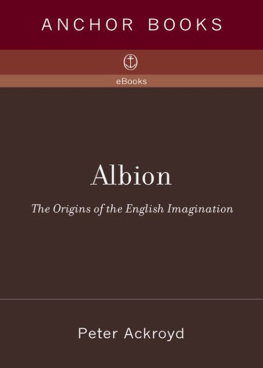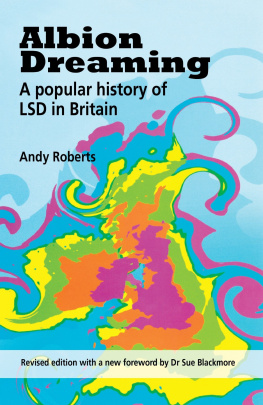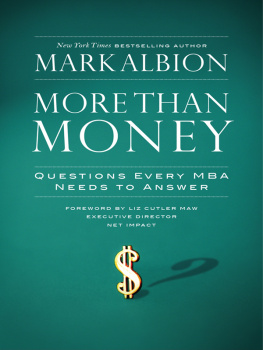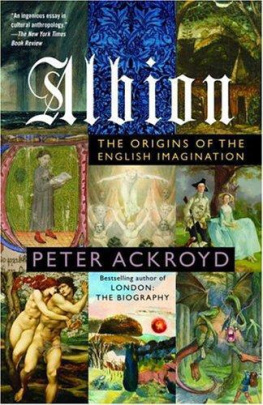Office Life by Keith Waterhouse
1
'Mr Graph-paper, Mr Seeds, Miss Divorce, Mrs Rashman, Mr Ah Dah, Mr Beastly, Mr Charles Penney, Mr New Penny, Mr Hakim.'
Catching one name in three, Clement Gryce shook hands with such of his new colleagues as were near enough to touch, and nodded to those who were out of reach behind their desks.
Most of them said a word or two: 'How d'y'do.' 'Glad to have you aboard.' 'Welcome to the madhouse.' They seemed a nice enough lot taken all round, though Gryce put question marks over the heads of two of them, Beastly and Graph-paper, who could very easily have shaken hands if they'd bothered to stand up and lean forward a bit. Graph-paper, he already knew from his interview with Copeland who had mentioned a Mr Grant-hyphen-something or other, was Copeland's deputy. Beastly looked as if he might be next in the chain of command.
'Not forgetting Thelma who looks after us all.' Copeland, who put Gryce in mind of the actor Mervyn Johns, waved an arm towards the dumpy office girl, a recent school-leaver by the look of her. She bore a passing resemblance to the girl who had played Judy Garland's room-mate in an old film recently repeated on television. Gryce gave her a brief smile and permitted his glance, as it swivelled back to Copeland, to take a short detour via the other two females present.
Mrs Rashman must have been about fifty, or ten years older than himself. That didn't necessarily rule her out. Some of these homely-looking ones really knew how to let their hair down once they'd watered the pot plants and left the office for the day, so it was rumoured. But the younger one thirtyish? thirty-fiveish? was probably the likelier of the two, so long as her real name proved to be something less provocative than Miss Divorce. That was definitely the once-over she had given him when the commissionaire had shown him in. She reminded Gryce of a well-known news reader. Gryce watched TV a lot and nearly everyone he met reminded him of some celebrity or character actor, though he could not always put a name to the face.
'Now, where are we going to park you?' Copeland went on. 'As I think I told you, the whole department is to be reorganized quite soon so I'd rather not move in a new desk just yet. Who's on holiday?' he asked the man he had introduced as Mr Seeds. 'Isn't Fart still away?'
'I believe till next Monday.'
'Let us consult the holy writ.' Taking Gryce's arm, Copeland steered him across to the staff notice-board.
The office was open-plan, so there were no interior walls except the waist-high metal partitions that marked out the corridors between the three departments occupying the seventh floor. Putting up a notice-board that could be consulted without descending to one's knees had therefore presented a problem, which had been solved by a small team from Design and Maintenance after some experiment. First they had hung a sheet of cork on chains from the ceiling, only to find that it swung erratically backwards and forwards with a tendency to bat employees in the face as they walked past it. A heavier board was substituted, resulting in no marked modification except that some of the injuries sustained were now quite serious. The chains were stabilized with strong wooden battens, but the weight of these buckled the composition ceiling tiles. Finally a free-standing blackboard affair, on the lines of those to be seen in railway stations with regrets about late trains in chalked copperplate, had been devised. This method, pioneered in the department which Gryce had just joined, was now standard throughout the building.
The notice-board was dominated by a large sheet of card divided into columns. This, Gryce saw, was the holiday roster: he would have to see that he got his name down before all the best weeks were taken. While Copeland studied the list he was able to do some deciphering. The likelier of the two women, the one whose name he had heard as Miss Divorce, must be Mrs Fawce. (So she was married, then. Best thing in the long run, so long as they were discreet enough. From all he'd heard, the single ones finished up nagging to be taken out at weekends.) Ah Dah was Ardagh, that was an easy one, but who was New Penny? There was a C. Penney and an H. Penney, both taking the same week in June and the same two weeks in September, they must be brothers. Of course: Hugh Penney. Graph-paper, he remembered the name now, was Mr Grant-Peignton.
'Yes, here we are. Fart.' The holiday roster mentioned Vaart. Dutch extraction: South African, most likely. 'I should take his desk for this week, and then I see Mr Hakim won't be here the following week, so you'll have somewhere to sit for the time being.'
Wondering idly how the self-effacing Mr Hakim got along with Mr Vaart, whom he pictured as a red-necked Afrikaaner, Gryce took his place at the vacant desk. The desks were in rows of three and he found himself sitting between Beastly and Seeds. Beastly's real name, it would turn out, was Beazley. Seeds, to Gryce's surprise, was called Seeds. Both men looked like Jeremy Thorpe, MP Seeds more so.
'Ron Seeds, in case you didn't catch the name in all that welter of introductions.' Seeds half-rose and shook hands again as Gryce sat down. Beazley, who was flicking rapidly and endlessly through a revolving card-index as if conducting an experiment in administrative perpetual motion, did not look up. He might have nodded, Gryce thought. But Seeds seemed ready to be friendly.
'Do you prefer coffee-flavoured dishwater or tea-flavoured dishwater?'
The familiar office joke made Gryce feel quite at home. 'Coffee-flavoured, I usually have.' He smiled again at the overweight junior who, with a good deal of clattering, was extracting a number of beakers from a filing cabinet and arranging them in a wire tray.
'Don't worry, we're not offending Thelma,' said Seeds. 'She doesn't brew it herself, it's all untouched by 'uman 'ands.'
'Ah, an infernal machine.'
'The wonders of modern technology. If you press the button marked tea it pours forth a liquid resembling coffee'
' whereas the button marked coffee produces a frothy substance that could be mistaken for tea, yes,' completed Gryce. Thelma was now clomping flat-footedly from desk to desk with her tray of beakers. This was obviously a morning routine: she collected the money for the vending machine, at the same time jotting down individual requirements on a scrap of cardboard three coffees, one tea and one 7-Up so far, Gryce noted as Thelma reached his desk and then did the rounds again dispensing the completed orders. It seemed inefficient: two journeys instead of one. In Gryce's last billet, the office girl had kept a little book and they had settled up weekly; but he could quite see that given the need to feed the vending machine with tenpenny pieces, Thelma would have to find a daily supply of coins.
Raising his right buttock slightly he felt among the coins in his pocket for the milled edge of a tenpenny piece, but Seeds had beaten him to it. 'My treat, as you're a new boy.' He mustn't forget to reciprocate in the afternoon tea break. When he had a desk of his own, after the departmental reorganization that Copeland had spoken about, he could see this becoming a little daily custom, always supposing that he was still sitting next to Seeds or in his near vicinity. Seeds would stand him coffee in the mornings and he would stand Seeds tea, or whatever he preferred, in the afternoons. Since all drinks seemed to cost the same, Gryce had no objection to arrangements of this kind. They were what made the wheels go round, in his opinion.
The beverages arrived. The 7-Up drinker turned out to be Mr Hakim. That was easy to pin down because the 7-Up was served to him in a disposable plastic cup. Gryce expected the vending machine dispensed these cups and that it would be possible to have one's coffee or tea served in them. But the staff had probably found that they were difficult to hold when hot, or that their waxen texture caused an unpleasant taste. Perhaps there had been days when the vending machine had run out of plastic cups, and they had had to forgo their coffee break. At any rate they had clearly discussed it among themselves and decided to buy mugs or beakers or fetch them from home. The beaker Gryce had been given was a souvenir one from Cornwall; it was his guess that it belonged to the absent Vaart. He would have to bring one of his own or perhaps it would be less trouble if he gave some money to Thelma and she could buy one during her lunch hour.

